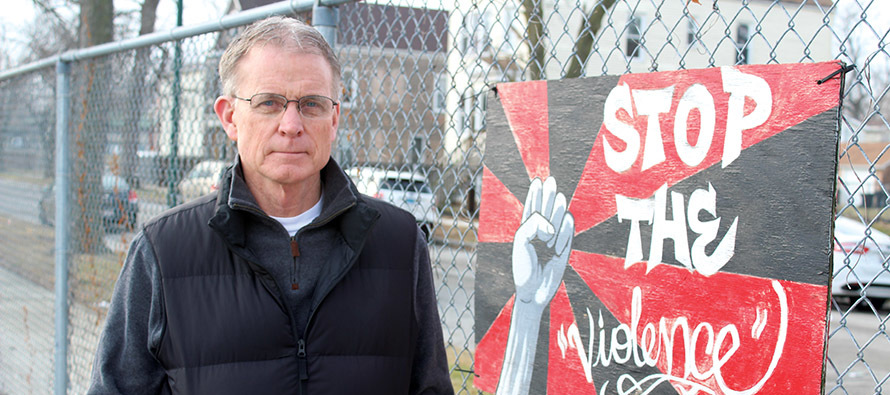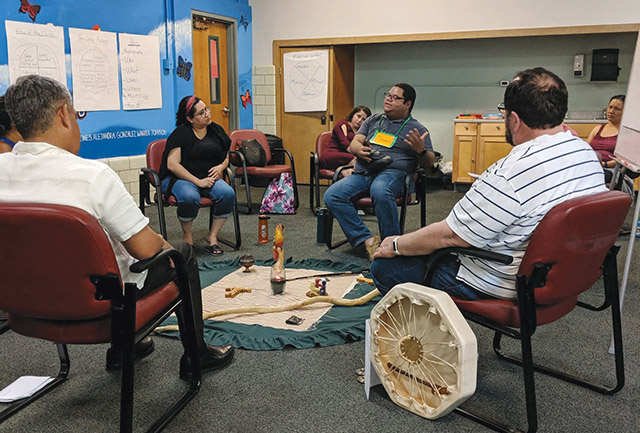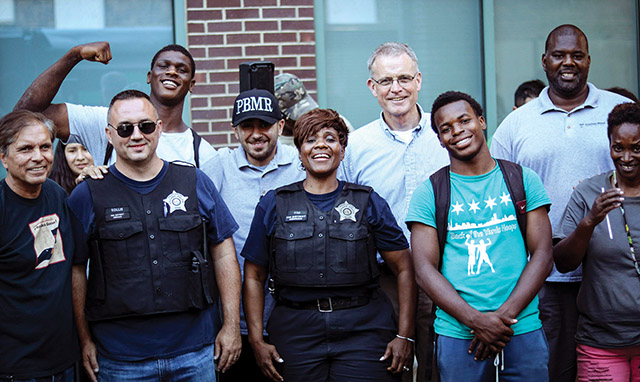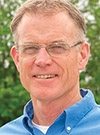In search of healing, one story at a time

Father Dave Kelly, C.PP.S. leads the Precious Blood Ministry of Reconciliation in Chicago. One of its focuses is enabling local residents to overcome trauma through storytelling. (Photos courtesy of Precious Blood Ministry of Reconciliation)
After decades of jail ministry, Father Dave Kelly, C.PP.S. got tired of sitting with families damaged by violence in some of Chicago’s toughest neighborhoods. The criminal justice system never seemed to bring much peace to families hurt by violence, and it seemed to inflict its own pain on the incarcerated and their families. In 2002, his religious community founded the Precious Blood Ministry of Reconciliation with a goal of restorative justice, including an emphasis on helping people heal from trauma. VISION brings you a condensed version of Kelly’s reflections on his ministry, drawn from a talk he gave in 2020 to the National Religious Vocation Conference.
LET ME TELL YOU ABOUT about a case that arose when I was a pastor on the South Side of Chicago and also doing jail ministry. Alberto was a young man in our parish after-school program. He came every day, often climbing up the back stairwell where my office was so he could sit there and recount the day’s happenings until I’d shoo him back down to study. One day I got a call about five minutes after he’d left and learned he had been shot. I went to the hospital to be with his family. Alberto needed open-heart surgery, and so this went on for days, just being there, praying with the family, supporting them, hoping along with them that Alberto would survive.
About day four or five, he started to get stronger, and the police came to the hospital carrying the same type of manila file folder they always have. They had come to ask Alberto to identify the person who shot him. When they opened that file folder, clipped inside was a picture, and I recognized the young man in the photo. His name was Wilfredo. I knew him and I knew his family. After the police left, I stayed with Alberto and his mom for a while.
Then I left and went to the jail where they held Wilfredo. I went into the maximum-security dayroom where he was sitting. He got up and gave me a look that said, “I knew you were coming.” By then he knew the person he had shot was part of the parish. Later, when I left Wilfredo, he knew I was going to leave his jail cell and visit the person who would ultimately testify against him in court.
Wilfredo and Alberto both were OK with that, both understood that. Both knew that’s what we in religious life do: We stand in the breach, in that muddled mess, to witness to the possibility of reconciliation, the possibility of hope in those kinds of dark spaces.
About two and a half years later when we finally went to court, I was with Alberto and his mom as we sat in a small room adjacent to the courtroom waiting for Alberto to give his testimony. A young state’s attorney came in to prepare him. He said, “Now look, Alberto, this is what I want you to say, and this how I want you to say it so we can get as much prison time for this guy as possible. We want to send him away for as long as we can.” He kept saying that over and over.
Now I knew Wilfredo; I knew that one act of violence wasn’t the entirety of who he was. And so I leaned over to Alberto and I said, “Alberto, just tell the truth.” This young state’s attorney got very angry at me for “interfering” with the testimony.
Ultimately Wilfredo got 27 years in prison, and Alberto, his mom, and I were dismissed to walk home after that final day in court. They went to their apartment, and I went to the office and sat there with a sinking feeling in my gut. In all that time, two and a half years, no one in the criminal justice system ever asked Alberto, “How are you doing?” No one ever attended to his needs. No one ever asked his mom, “Is there anything we can do? Is there any support we can offer?” All the energy and resources were on punishment. How were they going to get this other young man, Wilfredo, for what he did? How could they get him good so others would “learn”? I sat in my office and thought: We can do better than this.

Taking a bold step in ministry
That pushed forward an idea my community had been discussing. We were asking ourselves, what would it look like if we conducted a ministry of reconciliation in a community impacted by violence and incarceration? A community that was suffering on both sides, victims and perpetrators and their families.
Thus, in 2002 we started the Precious Blood Ministry of Reconciliation (PBMR) based on the philosophy of restorative justice, which emphasizes repairing relationships that have been harmed. We acquired an old school building, fixed the property up and essentially created an oasis, a space where people can today find some hope and healing.
The fact is that a great deal of healing needs to happen. Not that long ago, a young man who was very much a part of PBMR was shot and killed just down the block from us. The impact was powerful, devastating, to the young people, his family, and also for us on the staff. You could see on people’s faces the pain of losing Brandon, who had been so much a part of our lives. We held a funeral. We sat in circles and talked about Brandon, but the sting of his death, even months later, still remains. The trauma of his death remains for all of us.
Brandon’s death shows that violence is not a singular act, but rather it is a trauma that continues to haunt us as we strive to move on with our lives. The core of who we are is our relationships with one another and our relationship with God, but trauma and violence cut at that very core. Experts point out that traumatic acts—violence, divorce, losing a job—cause us to question our own basic worth in relationships. They damage our family relationship and our community. Often after losing a child to violence, a family begins to deteriorate. Divorce rates go sky high. Thus, the traumatic event is a singular event, but the scars can last for years, especially if they remain untreated.

Our stories as part of the Christian story
A crucial way to heal is through storytelling because it allows us to knit our lives back together. It will never be the life from before. A young person damaged by violence will never go back to being a little kid who never experienced all this trauma. A mother who lost her child to homicide will never be a mother who doesn’t know that kind of pain. However, through storytelling in safe spaces we begin to put our lives back together, and they begin to make sense, little by little.
Think about it. Think about our own Christian story of what happened on the way to Emmaus (Luke 24:13-35). Jesus encounters two disciples recounting the horror and pain of his crucifixion. They don’t yet recognize that he is Jesus. He listens to their story of trauma and puts it into the larger story of the prophets, explaining how this had to happen. Eventually the disciples say they’re going to stop for the evening. They coax Jesus to come and eat with them. He sits with them, and in the breaking of the bread, scripture tells us, they recognized him.
TO SHARE HARD STORIES
One time I was giving a talk about our ministry at Dominican University outside of Chicago and I brought a young man, Joe Montgomery, with me to tell his story. I spoke, and then he stood up and spoke from his heart. Afterward people thanked him for being so real, so open about his pain, his hurt, his life story.
On the ride home, traffic was normal, which is to say there was a lot of it. Joe was very quiet, just looking out the side window. I asked him, “Joe, what’s going on? What’s the matter?” He shook his head and kept staring out the window.
Finally he turned to me with tears in his eyes, and spoke of how alone he felt, like everyone had left him. Giving his talk brought up all kinds of traumatic memories in his life, and he became his story once again. He was still struggling with many issues: he’s been locked up a number of times, his brother was locked up for 55 years, his father was not in his life. All that came tumbling down on him. What was bothering him wasn’t a traumatic event from years ago but all the events that followed it. He was still feeling the impact of all that hurt.
I said to him, “You know, Joe, we got you. We’re here for you.” He said, “I know, Father Kelly, I just feel like nobody is thinking of me. My mom is just doing her thing now.” Luckily, the traffic was heavy, and all that stop and go gave us time to talk. And that we did. That car became a safe place where I listened to Joe and allowed him to tell his story.
Then he disappears. But they don’t freak out that he’s left again. Rather, they get up filled with joy and life, and they go back to Jerusalem to tell this story of how they met Jesus on the road to Emmaus. Jesus didn’t scold them for not understanding; he simply listened to their story of trauma and then placed that story, that trauma, hurt, and pain, into the context of the larger faith story. Along with Jesus, then, they come to a new place, a new creation.
Grieving mothers move toward healing
Here’s an example of what can happen when people are encouraged to rightly and truthfully tell their story. I used to sit with a group of mostly Spanish-speaking women who would tell about losing their children to homicide. They knew that I went into the jails and detention centers. That was hard on them at first, but they got to know me and for some reason liked me. They would ask, “Do these kids who are locked up ever seek forgiveness or express remorse?” I would tell them that, yes, they often do. Young people in those spaces are often sorry for what they’ve done, but there’s no one there to seek forgiveness with. The courts kind of interfere with that because you’re not supposed to talk with others about your case, and often you have to deny your wrongdoing.
These women kept asking me about the young people I met in the jail, so I invited them to come with me and meet them. Of course they said no to that. They didn’t want to be part of jail. So I told them, “I say Mass there on Saturdays. Come with me to Mass.” Now Mass they understood, and so they agreed.
After the Mass I invited some of the young people to sit in what we call a “peacemaking circle” with these women. These were young people being tried as adults, so they had serious cases. We sat in that space and we did our opening as we always do, which is a check-in. Each person tells how they are doing. I asked the mothers to introduce themselves. The young people’s eyes were wide open. When the talking piece (an object we hold when it’s our moment to speak) came to the young people, they each began to talk about who they were. One said he never knew his mother. Another said his mother was in prison. Someone else said his mom was on drugs.
You could see the mothers in that group who started out kind of reticent, with their arms crossed in front of themselves, protecting themselves, start wondering who these young people were. You could see them begin to lean in. As the young people told their stories, the women started looking at them differently. They started engaging with them. What happened in that space was that these mothers recognized these young people not just as thugs and thieves but as humans who have also struggled. They were people who had also suffered.
Those mothers and young people were taking a small step toward healing and reconciliation. We know that Jesus carries his scars and trauma, but he returns to us whole and with the purpose of bringing new life. If we embrace that story, if we embrace the Christian message, then we too can find ourselves in a new place and space. We’ll be on a path toward reconciliation.
Related articles: VocationNetwork.org, “Tendering God on tough streets” and “Feeding Jesus’ friends.”
Tags
Related
- Taking a chance on God: Profile of Father David Gutierrez, C.M.F.
- About-face to the priesthood
- Moved by the power of the Eucharist: Profile of Father Duy Henry Bui Nguyen, S.C.J.
- No regrets: A grateful priest takes stock
- We’re different—in a good way: Profile of Father Roberto Mejia, O.Carm.
- Man with a mission
- Monastic life is habit-forming
- Ministering to migrants in a carport cathedral
- Connections make the man: Profile of Father Kevin Zubel, C.Ss.R.
- A priest (who’s been there) responds to the pain of addiction Read More
Most Viewed
- Find your spirituality type quiz
- Questions and answers about religious vocations
- Celibacy quiz: Could I be a nun? Could I be a brother? Could I be a priest?
- Resources for older discerners or those with physical and developmental differences
- About Vocation Network and VISION Guide


